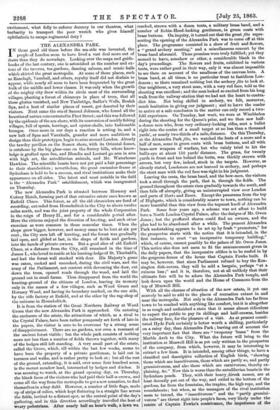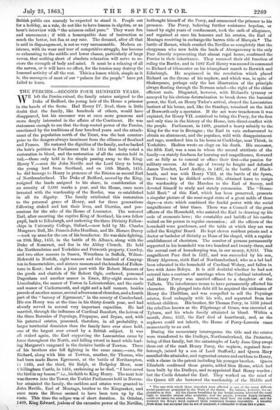THE ALEXANDRA PARK.
IN those good old times before the sea-side was invented, the people of London seem to have lived a vast deal more out of doors than they do nowadays. Looking over the maps and guide- books of the last century, one is astonished at the number and ex- tent of the taverns, tea-gardens, dancing saloons, and music-halls which skirted the great metropolis. At some of those places, such as Ranelagh, Vauxhall, and others, royalty itself did not disdain to appear, while nearly all seem to have been frequented by the great bulk of the middle and lower classes. It was only when the growth of the mighty city drew within its circle most of the surrounding villages, planting a forest of chimneys in place of trees, that all these glories vanished, and New Tunbridge, Sadler's Wells, Beulah Spa, and a host of similar places of resort, got deserted by their visitors. Next came the era of Samuel Johnson, who found all the beauties of nature concentrated in Fleet Street; and this was followed by the epidemic of the sea-shore, with its conversion of muddyfishing villages, full of sprats, herrings, and oyster-shells, into fashionable lounges. Once more in our days a reaction is setting in, and a new belt of Spas and Vauxhalls, grander and more ambitious in design than their prototypes, begin to arise around London. Already the tawdry pavilion on the Sussex shore, with its Oriental domes, is outshone by the big glass-case on the Surrey hills, where know- ledge is grafted upon fun, and Blondin and Leotard go arm in arm with high art, the antediluvian animals, and Mr. Waterhouse Hawkins. The scientific beasts have not yet paid a fair percentage to their shareholders ; nevertheless, the great cucumber-frame at Sydenham is held to be a success, and rival institutions make their appearance on all sides. The latest and most notable in the field is the "Alexandra Park" establishment, which was inaugurated on Thursday.
The new Alexandra Park is situated between Hornsey and Colney Hatch, forming part of that extensive estate once known as Enfield Chace. This forest, as all the old chroniclers are fond of recording, extended from Houndsditch in the City to above twelve miles north, and was the joint property of the whole Corporation in the reign of Henry II., and for a considerable period after. Here the citizens enjoyed the diversion of hunting, and such other exercises as were common in those muscular times. When the shops grew bigger, however, and money came to be lent at six per cent., the City men left off hunting, and the forest was gradually laid open, and glided at last, in the shape of fields and gardens, into the hands of private owners. But a good slice of old Enfield Chace, at a distance from the City, still remained in the time of James I., who loved to reside at his hunting-lodge of St. Theobald's, and had the forest well stocked with deer. His Majesty's game was eaten, cooked and uncooked, during the civil wars, and the army of the Parliament, not content with devouring the deer, cut down the trees, opened roads through the wood, and laid the ground out in small farms. Thus disappeared from the world the hunting-ground of the citizens of London, leaving its memory only in the names of a few villages, such as Wood Green and Hornsey Wood, and having its boundary marked, on the one side, by the rifle factory at Enfield, and at the other by the rag-shop of the universe in Houndsditch.
It is from the station of the Great Northern Railway at Wood Green that the new Alexandra Park is approached. On entering the enclosure of the estate, the attractions of which, as a rival to the Crystal Palace, have been rather pompously set forth of late in the papers, the visitor is sure to be overcome by a strong sense of disappointment. There are no gardens, nor even a remnant of the ancient forest visible ; but the whole park consists of nothing more nor less than a number of fields thrown together, with many - of the hedges still left standing. A very small part of the estate, called the Grove, which, till within the last few weeks, seems to have been the property of a private gentleman, is laid out in terraces and walks, and is rather pretty to look at ; but all the rest of the ground, extending, it is said, over some four hundred acres, is the merest meadow land, intersected by hedges and ditches. It was amusing to watch, at the grand opening day, on Thursday, the blank faces of the visitors who had paid their half-a-crown, and come all the way from the metropolis to get a new sensation, to find themselves in a hay-field. However, a number of little flags, made up of strips of calico, which kept fluttering in a straight line across • the fields, invited to a distant spot, as the central point of the day's gathering, and in this direction accordingly travelled the host of weary pedestrians. After nearly half an hour's walk, a lawn wa reached, strewn with a dozen tents, a military brass band, and a number of Robin-Hood-looking gentlemen, in green coats with brass buttons. On inquiry, it turned out that the great fête repre- senting the opening of the Alexandra Park was to come off at this place. The programme consisted in a show of fruit and flowers, a "grand archery meeting," and a miscellaneous concert by the braes band aforesaid. These promises were truly fulfilled; yet they seemed to leave, somehow or other, a considerable blank in the day's proceedings. The flowers and fruits, exhibited in various tents, were rather good in their way, only it was almost impossible to see them on account of the smallness of the canvass huts. A braes band, at all times, is no particular treat to fastidious Lon- doners; so there remained nothing but the archery fele to look at. Our neighbour, a very stout man, with a very red face, told us the shooting was excellent; and the man looked so excited from his long walk from the railway-station that we had not the heart to contra- dict him. Not being skilled in archery, we felt, moreover, much hesitation in giving our judgment ; and to leave the reader to arrive at a safe conclusion in the matter can only record a two- fold experience. On Tuesday, last week, we were at Wimbledon during the shooting for the Queen's prize, and we then saw half- a-dozen men who, from very ordinary-looking rifles, sent a bullet right into the centre of a small target at no less than a thousand yards', or nearly two-thirds of a mile, distance. On this Thursday, at the Alexandra Park f&e, we watched the feats of a score and a half of men, some in green coats with brass buttons, and all with bran-new weapons of warfare, but who vainly tried to hit the bull's-eye at about 150 yards' distance. The grass, for twenty yards in front and ten behind the butts, was thickly strewn with arrows, but very few, indeed, stuck in the targets. However, as already stated, Londoners are not learned in archery, and perhaps the stout man with the red face was right in his judgment.
Leaving the tents, the brass band, and the bow-men, the visitors took a stroll through the park, that is, through the fields. The ground throughout the estate rises gradually towards the south, and then falls off abruptly, giving an uninterrupted view over London and parts of Herts and Essex. Except the panorama from the top of Highgate, which is considerably nearer to town, nothing can be more beautiful than this view from the topmost knoll of Alexandra Park. Some four years ago, a scheme was set afloat to build here a North London Crystal Palace, after the designs of Mr. Owen Jones ; but the proffered shares could find no owners, and the plan had to be abandoned after a while. The present Alexandra Park undertaking appears to be set up by fresh "promoters," for the prospectus starts with the notice that it is intended, in the first instance, to erect "an inexpensive temporary building," which, of course, cannot possibly be the palace of Mr. Owen Jones. This notice also does not seem to fit the announcement given in the daily papers, that the inexpensive edifice is to be roofed in by the gorgeous domes of the house that Captain Fowke built. It may be, however, that since Parliament refused to buy the Ken- sington dish-covers, they will be sold a bargain, perhaps "at a ruinous loss ;" and it is, therefore, not at all unlikely that their ultimate fate will be to adorn the Alexandra Park temple, and look down upon the world and the House of Commons from the top of Muswell Hill.
With all the charms of situation of the new estate, it yet can scarcely be said to add to the places of recreation extant in and near the metropolis. Not only is the Alexandra Park too far from town to be reached with anything like comfort, but it is altogether in so rough and unfinished a state that it seems almost ridiculous to expect the public to pay its shillings and half-crowns, besides the railway fare, for the pleasure of a visit. As at present consti- tuted Hyde Park certainly is better worth a shilling, particularly on a rainy day, than Alexandra Park ; leaving out of account the very important fact that there are "twopenny 'buses" from the Marble Arch to the City. What the future will bring to the institution at Muswell Hill is as yet only written in the prospectus of the company, from which, however, it may be interesting to extract a few lines. It is intended, among other things, to have a classified and descriptive collection of English birds, "showing those which are insectivorous, those which are partly so, and partly graminivorous, and also those which are carnivorous, thereby ex- plaining, &c." Now this is worse than the antediluvian beasts in the Sydenham ponds. They, with their heavy -Greek names, are at least decently put out of the way, and exiled to the bottom of the gardens, far from the fountains, the trapeze, the high rope, and the roundabouts ; but when, as the managers of the rival institution seem to intend, the " insectivorous " and the "partly gramini- vorous " are thrust right into people's faces, very likely under the centre of Captain Fowke's contrivance, the impatience of the British public can scarcely be expected to stand it. People out for a holiday, as a rule, do not like to have lessons in algebra, or an hour's interview with "the sciences called pure." They want fun and amusement ; if with a homeopathic dose of instruction so much the better, but fun at any rate. The demand, after all that is said in disparagement, is not so very unreasonable. Modern ex- istence, with its wear and tear of competitive struggle, has become so exhausting to the middle and lower classes, particularly of large towns, that nothing short of absolute relaxation will serve to re- store the strength of body and mind. It must be a relaxing of all the nerves, or it will have no effect, for the tension may destroy the lessened activity of all the rest. This is a lesson which, simple as it is, the managers of most of our "palaces for the people" have yet failed to learn.































 Previous page
Previous page